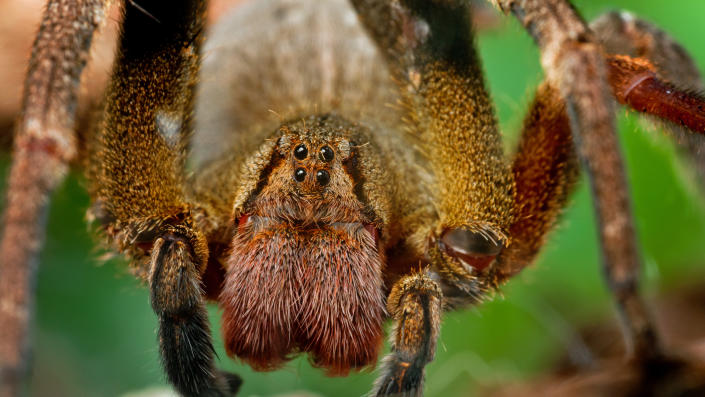Spiders are common critters. And, as almost all of Earth’s 43,000 known spider species are venomous, it is likely that most people have encountered a venomous spider at one point or another.
So that’s the bad news. The good news, however, is that of these, only 25 species are known to have killed or caused serious harm to humans. But which spider is the deadliest?
The deadliest spiders — or at least those most frequently cited as having caused death or serious injury to humans — are funnel-web spiders (Atrax), redback and black widow spiders (Latrodectus), banana and wandering spiders (Phoneutria) and recluse spiders (Loxosceles).
But even these deadly spiders, with potent venom and fangs primed for piercing skin, are not particularly dangerous to humans. The American Association of Poison Control Centers (AAPCC) tracked only one death caused by a spider bite in the U.S. in 2021. Australia, home to some of the most venomous spiders in the world, hasn’t reported a single spider bite death since the 1980s.
“It is incredibly rare to have a deadly spider encounter,” said Rick Vetter, a retired research associate with the Department of Entomology at University of California, Riverside, whose research focused on medically important spiders. “Considering all the bad things that could happen to you, if spiders are your biggest concern, then you are living the good life.”
Funnel-web spiders top the list of deadliest spiders, if only for their storied venom. Native to Australia, these spiders boast venom that’s so potent their bite can kill within minutes. “The deadliest is probably the funnel-web spider and its relatives. The Sydney funnel web spider (Atrax robustus) can kill a toddler in about 5 minutes and a 5-year-old in about 2 hours,” Vetter told Live Science. Although no one has died from these spiders since the advent of antivenom in the 1980s, it is difficult to imagine a toddler receiving treatment soon enough to recover from a funnel-web bite.

Phoneutria spiders, the most common of which are often referred to as banana spiders or wandering spiders, are native to Brazil and have the most neurologically active venom of any spider. But they rank a bit lower on the list of the world’s deadliest spiders because their venom works relatively slowly, leaving ample time for treatment. And Loxosceles spiders, the most familiar of which is the brown recluse (L. reclusa) found in the U.S., may be one the most common causes of spider-related injuries, with painful bites that can cause body aches and fever and take months to fully resolve. But they are very rarely deadly.
The only arachnid genus that gives the funnel-web a real run for its money as the deadliest spider is Latrodectus, which includes the Australian redback (Latrodectus hasselti) and the more familiar black widow spider in the U.S. These spiders have a slight edge because they bite humans more frequently than funnel-web spiders, with comparably potent venom. “The most venomous species (Sydney funnel-web spiders, Brazilian wandering spiders) don’t kill or impact that many people,” Linda Rayor, a behavioral ecologist at Cornell University who focuses on spiders, told Live Science in an email. “It is the more widely-distributed black widows that are going to be the stars of your story.”
It’s important to note that, while AAPCC’s annual reports carve out a section for spider bite statistics, it isn’t easy to get a real handle on spider bite mortality or morbidity.
“A number of human deaths each year are attributed to spiders,” Rod Crawford, curator of arachnids at the Burke Museum at the University of Washington in Seattle, told Live Science in an email. “However, from a scientific viewpoint, almost none of these attributions are evidence-based.”
It is exceedingly rare, Crawford explained, for a victim to see a spider on their skin, feel a bite, capture that same spider, and then bring the offending spider to a physician (let alone a spider specialist) for analysis. “Practically all of the ‘spider bites’ you hear about, including those reported to poison centers originate from the belief that if you didn’t see what bit you, it was a spider,” Crawford said.
Rayor echoed this sentiment. “I have spent a surprising amount of time trying to track down the human mortality rate from spiders and it is miniscule,” she said. “This isn’t reliably reported, but it is clear that not that many people get killed by spiders.”
Keeping in mind the flawed nature of spider bite statistics, The Australian Museum claims that about 2,000 people are bitten by redback spiders each year, and that the antivenom to treat funnel-web spider bites has been given to about 100 patients since 1980. AAPCC’s annual report tracked about 3,500 spider bites in the U.S. in 2021, with about 40 “major” clinical outcomes. Nine of those serious outcomes were attributed to black widows; 29 major outcomes and the only death that year were attributed to brown recluses. There were no spider bite deaths in AAPCC’s 2020 report, which tracked seven “major” black widow bites and 23 “major” brown recluse bites.
This means that the deadliest spiders are, in fact, not very deadly. “True human spider bites of any kind — dangerous or harmless — are vanishingly rare,” Crawford said. “Take me as an example: Over a long career I have handled tens of thousands of live spiders with my bare hands. Only 3 actual bites resulted; none of the 3 had any significant effect. So when people tell me spiders crawl into their beds at night and bite them while they are asleep, I just roll my eyes.”
Vetter agreed. “In reality, spiders are way down the list of things to be concerned about.”
TYT Newsroom


